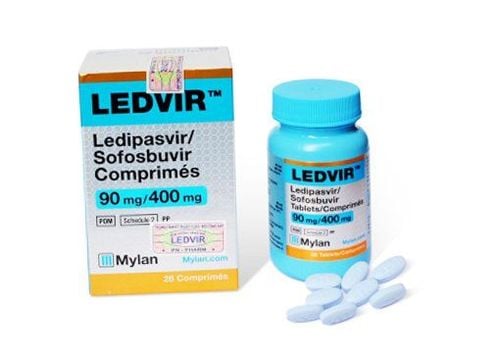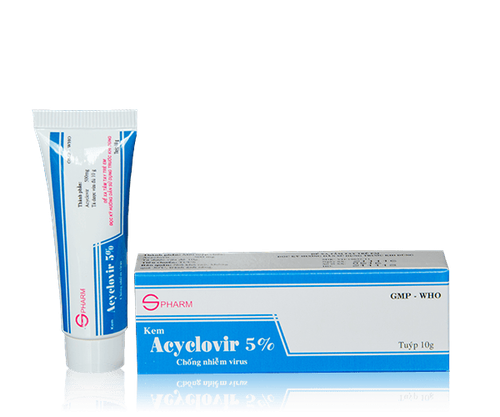This is an automatically translated article.
Demand for antiretroviral drugs for HIV-1 infected people is very high. There are many types of antiviral drugs, in which the active ingredient used is quite popular Tenofovir with the product Tenifo 300. So what is Tenifo and what problems should be noted when using it?
1. What is Tenifo?
Tenifo a product of Atra Pharmaceuticals Pvt. Ltd (India). The main active ingredient of Tenifo 300 is Tenofovir Disoproxil Fumarate 300mg.
Tenifo is indicated for use in combination with other antiretroviral agents in the treatment of HIV-1 and hepatitis B virus infections.
2. What are the uses of Tenifo 300?
This product is indicated for the following cases:
Combination of other antiretroviral drugs in the treatment regimen of HIV-1 infection in people over 18 years of age; Hepatitis B . Active ingredient Tenofovir disoproxil fumarate is an acyclic nucleoside phosphonate diester. In the first stage, this active substance undergoes hydrolysis to convert to tenofovir, then further phosphorylation through enzymes to convert to Tenofovir diphosphate. Tenofovir diphosphate works by inhibiting HIV-1 reverse transcriptase enzyme activity, through substitution of the natural 5' deoxyadenosine substrate and DNA strand termination after incorporation into DNA.
3. Dosage of Tenifo 300
Tenifo 300 for oral use. In case the patient cannot swallow, Tenifo can be used after dissolving the tablet with at least 100ml of filtered water or orange and grape juice.
Specific dose of Tenifo depends on each patient:
Adults: The recommended dose is 300mg (equivalent to 1 Tenifo pill), 1 time/day; Children: Tenifo 300 is not recommended for use in children under 18 years of age; Elderly: There are no data on the dosage of Tenifo 300 for patients over 65 years of age; Patients with renal failure: Tenofovir is excreted by the kidneys and when used, there will be drug accumulation in the body. Therefore, it is necessary to adjust the interval and dose of Tenifo 300 for cases with creatinine clearance below 50ml/min; Patients with hepatic impairment: No dosage adjustment of Tenifo is required for patients with hepatic impairment.
4. Tenifo 300 . side effects
Disorders in metabolism and nutrition: Hypophosphatemia (very common), lactic acidosis (rare); Central nervous system disorders such as dizziness, vertigo; Shortness of breath; Digestive dysfunction is common such as diarrhea, nausea, vomiting, flatulence and very rarely pancreatitis; Increased transaminases (liver enzymes), hepatitis; Erythema of the skin; Musculoskeletal diseases, osteomalacia; Renal dysfunction: Acute renal failure, proximal tubular disease, increased serum creatinine (but very rarely); Acute tubular necrosis.
5. Contraindications of Tenifo 300
People with a history of hypersensitivity to Tenofovir or other ingredients contained in Tenifo 300.
6. Some cautions when using Tenifo 300mg
Tenifo 300 is not recommended to be used at the same time with any products containing the active ingredient Tenofovir disoproxil fumarate; Tenifo has not been studied in people under 18 years of age; Tenofovir is excreted by the kidneys and has the potential to accumulate in patients with moderate to severe renal impairment (creatinine clearance less than 50 mL/min) when administered at a dose of 300 mg/day. Dosage adjustment is therefore required in these cases, and careful monitoring of cumulative toxicity such as renal failure is required. However, people with kidney failure and HIV infection can still take 1 tablet of Tenifo 300 as long as the interval between doses is reasonable; Hypophosphataemia in patients with renal failure using Tenifo has been reported. Therefore, patients should be monitored for creatinine clearance and blood phosphate before taking Tenifo, every 4 weeks for the first year and every 3 months for the time thereafter. Patients at risk, history of renal failure or confirmed renal failure may be monitored more closely: When serum phosphate is less than 1.5 mg/dl or creatinine clearance is less than 50 mL/min, renal function should be retested after 1 month. weekly, combined with blood glucose, blood potassium and urine glucose levels, and at the same time adjust the dose interval of Tenifo ; Consider discontinuing treatment when creatinine clearance falls below 50 ml/min or serum phosphate level falls below 1.0 mg/dl; The effect of Tenifo 300 on renal function has not been evaluated when co-administered with other drugs that are also nephrotoxic. If the combination is mandatory, it is necessary to monitor renal function more closely, even weekly; Tenifo 300 should be avoided in people who have been treated with antiretroviral drugs with potential strains of K65R mutations; There are no studies on the use of Tenifo in people over 65 years of age. However, this subject often has kidney failure, so it should be used with caution; Tenofovir and Tenofovir disoproxil fumarate are not metabolized in the liver, studies have shown no significant pharmacokinetic changes; Immune response syndrome: People with HIV are immunocompromised at the start of antiretroviral therapy (CART), so asymptomatic inflammatory reactions or opportunistic infections can occur and cause the patient's condition worsens. Patients are advised to seek medical attention when symptoms suggestive of pain, stiffness, or difficulty in moving the joints; There is no evidence that Tenifo 300 affects the ability to drive and use machines. However, side effects such as dizziness and lightheadedness have been reported with tenofovir and may affect this problem; Pregnancy: There is no clinical evidence regarding the use of tenofovir disoproxil fumarate in pregnant women. In addition, animal studies have not shown direct or indirect harmful effects of Tenifo to pregnancy, fetal development, labor or postnatal development. Therefore, Tenifo 300 should be used during pregnancy only when the benefits outweigh the possible risks; Lactation: Animal studies have shown that Tenifo may be excreted in milk. Although the ability of Tenofovir to be excreted in human milk is not known, it is not recommended for use by nursing women to ensure safety. However, as a general rule, women with HIV should not breastfeed to avoid transmitting HIV to the baby.
7. Tenifo Drug Interactions
Tenifo drug interactions can occur by different mechanisms:
Direct interaction with the metabolic pathway of Tenofovir; Possibility of indirect interaction via the CYP450 enzyme system; Acts on major renal excretion pathways, including glomerular filtration and active secretion via organic anion transporter (HOAT1). Some significant drug interactions of Tenifo 300mg:
Combinations of drugs that are actively excreted by the kidney by hOAT1 factor (such as Cidofovir) may lead to increased concentrations of Tenofovir or of the combination; The combination of other antiretroviral drugs such as Emtricitabine, Lamivudine, Indinavir, Efavirenz, Nelfinavir and Saquinavir did not cause clinically relevant interactions; The active ingredient Tenofovir disoproxil fumarate when combined with Lopinavir/Ritonavir showed no change in the pharmacokinetics of the two drugs. However, the Tenofovir AUC was increased by approximately 30% with the combination, which is related to the adverse effects of tenofovir, including renal dysfunction; Didanosine enteric-coated capsules when taken 2 hours before or at the same time as Tenifo 300 can increase Didanosine AUC by 48% and 60%, respectively. Therefore, Tenifo should not be combined with Didanosine; The combination of Tenofovir disoproxil fumarate, Methasone, Ribavirin, Rifampicin, Adefovir dipivoxil or oral contraceptives containing norgestimate/ethinyl estradiol did not cause a pharmacokinetic interaction; Tenifo when taken with food may increase the bioavailability of the drug. Tenifo is an antiretroviral drug indicated for the treatment of people living with HIV and hepatitis B. To ensure effective treatment and avoid side effects, patients need to take prescription drugs or consult a doctor or pharmacist. doctor.
Follow Vinmec International General Hospital website to get more health, nutrition and beauty information to protect the health of yourself and your loved ones in your family.
Please dial HOTLINE for more information or register for an appointment HERE. Download MyVinmec app to make appointments faster and to manage your bookings easily.













